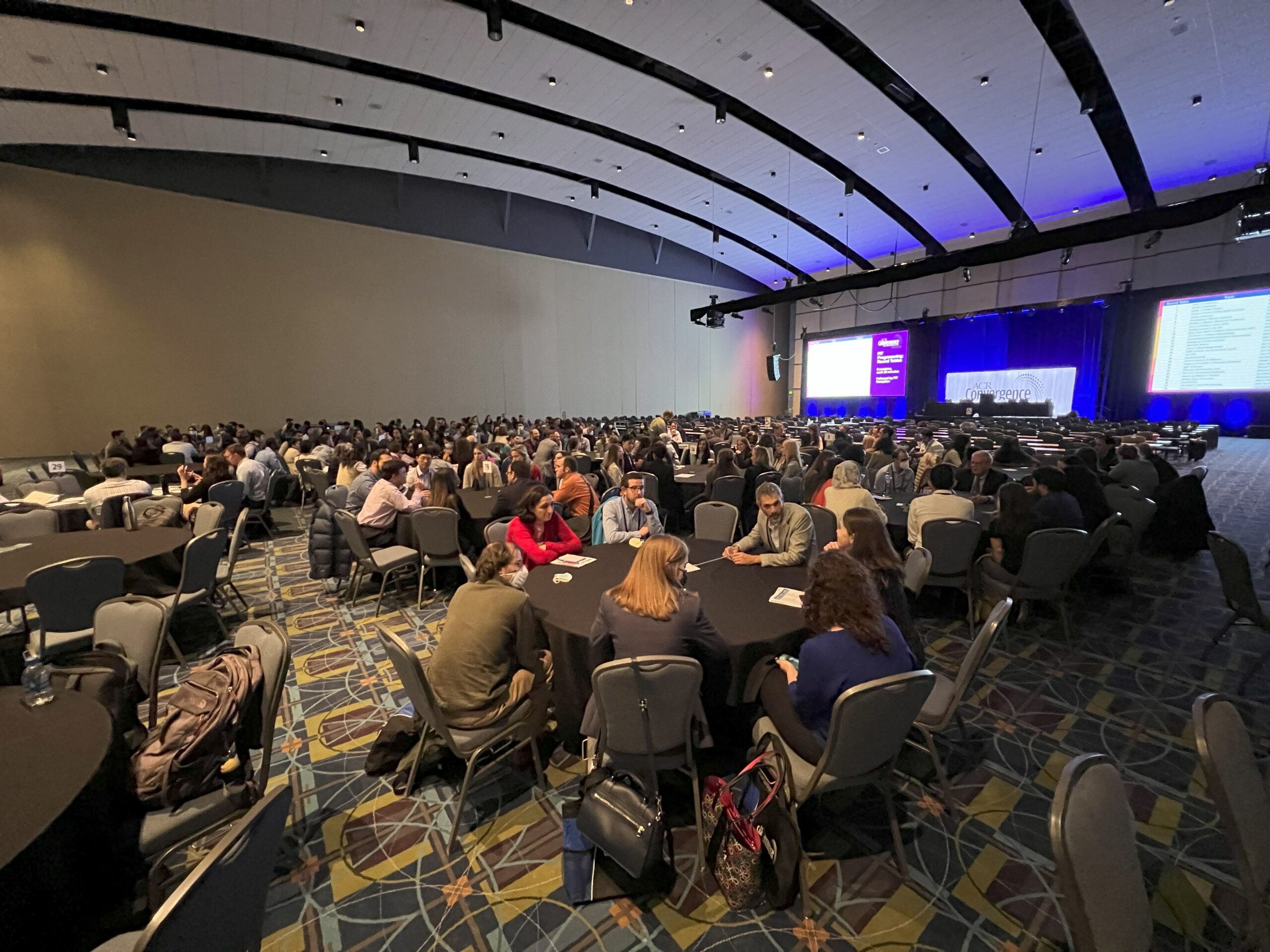
Following two years of virtual meetings, fellows in training were happy for the opportunity to meet in person during ACR Convergence 2022 in Philadelphia.
PHILADELPHIA—The fellows-in-training (FIT) programs at ACR annual meetings are highly valued educational sessions that also offer a forum for fellows to meet and connect with trainees from other programs. Fellows who were not able to meet in person during the pandemic years, particularly those who were in their second or third year of training, welcomed the opportunity to participate in this program at ACR Convergence 2022.
The FIT program was divided into two parts. The first included several presentations on a wide array of topics, including the development of a niche career path and an effective bio-sketch, negotiating a contract, financial planning, keeping up with the literature and doing all of that while maintaining work/life balance. Virtual hubs corresponding to the topics explored in part one were held during the remaining evenings of ACR Convergence for fellows who were unable to attend in person.
The second part was made up of more than 25 round tables, covering a variety of topics, with an expert moderator for each table.
Presentations
Justin Levinson, MD, MBA, an assistant professor of rheumatology, University of Wisconsin, Madison, and then-ACR FIT Subcommittee chair, welcomed fellows to the opening session and provided an outline for the program. Didem Saygin, MD, an assistant professor of rheumatology, University of Pittsburgh, and then-incoming ACR FIT Subcommittee chair, moderated the career panel.
Panelists included Bryant England, MD, PhD, an assistant professor of internal medicine in the Division of Rheumatology and Immunology, University of Nebraska Medical Center (UNMC), and a rheumatologist for the VA Nebraska-Western Iowa Health Care System; Arundathi Jayatilleke, MD, director of the rheumatology fellowship program, Temple University, Philadelphia; and Angus Worthing, MD, FACP, FACR, in private practice in the Washington, D.C., area. They represented distinct areas of the rheumatology workforce: clinical investigation, clinical education and private practice, respectively.
Questions focused on what motivated the panelists to follow a career in rheumatology, advice on private practice in rheumatology, how to be involved in research as a fellow, how to keep up with clinical skills and how to be involved in clinical education.
Fellows also asked pointed questions, such as why pediatric rheumatologists are not more involved in private practice in the U.S. Dr. Worthing mentioned that the number of pediatric rheumatologists remains low given the number of open positions. He said that when joining a practice, the question of coverage by other adult rheumatologists limits adult practices from opening up to pediatric rheumatologists.
Another discussion centered on the importance of identifying mentors, both internally and outside one’s institution, and the utility of personally reaching out to potential employers in practice and at academic institutions to identify career opportunities—whether or not a job opening is listed. The importance of starting the conversation and keeping it going cannot be overstated, said the panelists, and is essential when approaching the workforce after training.
Another fellow asked about the major pitfalls of the workforce and how to adapt to them. Dr. Worthing discussed how changes in the economy can have direct effects on a practice and how a fiscally minded approach is essential to running a practice as a business.
Dr. England said a large part of his day involves writing. To have the ability to explore novel research questions, he needs to be persistent about obtaining grant funding, he added.
Dr. Jayatilleke said that productivity and a sense of how finances are run are essential, even in an academic setting. She also discussed how working in institutions with different financial resources can prove challenging to the care and educational initiatives that one would want to provide.
Each speaker also hosted a round table in the second part of the day to field additional questions.
Contract Negotiations
Melinda Malecki, JD, MS, Malecki Brooks Law Group, Elmhurst, Ill., and Marianthi Kiriakidou, MD, director of the Division of rheumatology and the Jefferson Lupus Program, as well as an associate professor of medicine, Thomas Jefferson University, Philadelphia, discussed contract negotiations with an employer.
Some of the major topics Ms. Malecki discussed included written agreements vs. oral; the language of the contract; the term; what duties are spelled out; evaluating compensation and benefits together; the predictability of a straight base compensation; unpredictable variables in income, such as productivity bonuses; covenants (e.g., an enforceable geographical non-compete); termination without cause; potential ownership; and force majeure. Regarding these last three, Ms. Malecki emphasized the significance of including specific language in a contract to protect oneself as a new employee/contractor.1
Dr. Kirikadou offered an overview of the current landscape of rheumatology training in the U.S. and post-training career decisions. She noted that 126 accredited fellowship training programs were in place as of 2022.2 For the 249 fellows who completed training in 2021, slightly more than a third of trainees were pursuing a career in academic medicine, and over 50% were planning on pursuing private practice.
Dr. Kirikadou discussed questions fellows would be prudent to raise when looking for a job in an academic setting. She emphasized the importance of asking about research tracks and the requirements for each, the number of clinical sessions per week, the time allotted for new or follow-up patient visits, the adjustment of clinic templates for inpatient service and educational roles (e.g., participation in teaching with medical students and/or residency trainees), the direction of the division, relative value unit (RVU) goals, etc. The more questions one asks, the fewer the surprises that may arise and the more comfortable one will feel once starting the job, she said.
The next session was led by Tamika Webb-Detiege, MD, deputy head of admissions and enrollment and an associate professor of rheumatology, University of Queensland, Australia. She discussed the importance of maintaining work-life balance and time management. She offered techniques to improve work efficiency and develop financial well-being. She noted that work-life balance is not a benefit or something handed to you, but rather something created by an individual.
She referenced The 7 Habits of Highly Effective People by Stephen Covey, noting that many of these habits are essential to creating a healthy work-life balance.3 She stressed the importance of putting family and friends first, especially at home, and creating a clear separation between work done at home and home life. She noted that developing sustainable long-term practices to maintain physical, mental and spiritual health is important, and that being efficient and managing time lead to financial success as a physician.
Dr. Webb-Detiege also referred to the book The Four Agreements: A Practical Guide to Personal Freedom, by Don Miguel Ruiz. Mr. Ruiz makes four central points: 1) be impeccable with your word; 2) do not take anything personally; 3) do not make assumptions; and 4) always do your best.4
Finally, Alexis Ogdie, MD, associate professor of medicine and epidemiology, University of Pennsylvania, Philadelphia, led the discussion on establishing a career niche. She described her journey into psoriatic arthritis and identified key points that she thinks are essential to developing a career niche. Once one identifies and becomes passionate about a particular area within rheumatology, she says that speaking with other physicians and clinical investigators in different divisions and departments is helpful to envision a future clinic.
When building a clinic, Dr. Ogdie said, identifying a team, collaborators and stakeholders, as well as clearly demonstrating need and value in a specific area, are important to further develop a specific disease or niche-based program and be set up to expand. Funneling as many patients with a specific disease into a clinic allows you to start noticing patterns and trends, which drives new questions.
Reviewing the literature and trying to learn everything about a specific disease are essential to staying abreast of rapidly developing science, she said. Developing a systematic way of collecting data and then using those data to start publishing analyses and become involved in collaborative research efforts helps with name recognition and drives future projects. Using a template that is easily accessible and utilized allows for easy data collection and streamlines research productivity.
Dr. Ogdie noted that identifying a good mentor is essential to grow in a career niche, and one also needs to be a good mentee, which means having clear agenda items for meetings and action items.
Dr. Ogdie also noted that having a longterm plan, with a mission, vision and goals, is important, as well determining support structures and having continued clarity on the uniqueness of the developing program.
Round Tables
The second part of the program involved numerous round tables with topics of interest for fellows. Topics included a career in academics or private practice, ACR advocacy, keeping up with literature, medical education, job searches, and disease-specific topics, such as difficult lupus, spondyloarthritis, pulmonary hypertension and others. Each table had an expert moderator who drove the conversation, but each group had unique questions and discussions. Fellows rotated tables every 20 minutes, for a total of five sessions.
The FIT program concluded with a small reception for all the fellows and speakers—an excellent way for fellows to interact and mingle before the meeting began in earnest the following day.
Fellows Program ACR Convergence 2023
Current fellows in training can participate in the FIT program at ACR Convergence 2023, Nov. 10–15, in San Diego. Learn more at https://rheumatology.org/annualmeeting.
 Abin P. Puravath, MD, MHS, FACP, is a post-doctoral clinical research fellow in the Division of Rheumatology, Johns Hopkins University School of Medicine, Baltimore.
Abin P. Puravath, MD, MHS, FACP, is a post-doctoral clinical research fellow in the Division of Rheumatology, Johns Hopkins University School of Medicine, Baltimore.
References
- For new physicians. Malecki Brooks Law Group LLC. https://www.mbhealthlaw.com/for-new-physicians.
- Rheumatology (IM). FREIDA (the American Medical Association Residency & Fellowship Database). https://freida.ama-assn.org/specialty/rheumatology-im.
- Covey SR. The 7 Habits of Highly Effective People: Restoring the Character Ethic. New York: Free Press; 2004.
- Ruiz DM. The Four Agreements: A Practical Guide to Personal Freedom. San Rafael: Amber-Allen Publishing Inc.; 1997.



